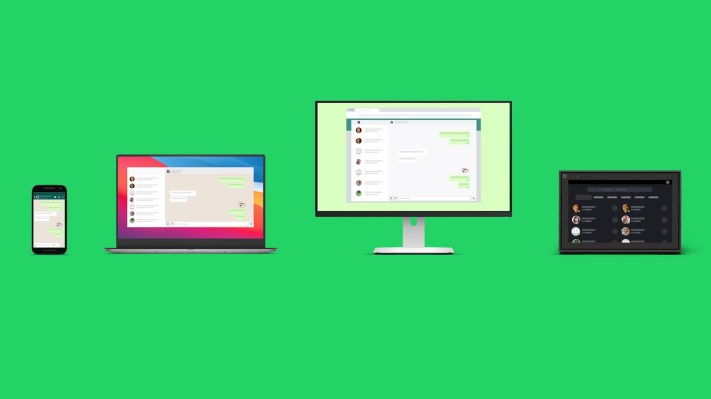WhatsApp is finally pushing an improvement to a key feature that even the Facebook-owned instant messaging service acknowledges has been a top request from users for years.
On Wednesday, WhatsApp said it is rolling out a limited public beta test for its improved multi-device capability.
The update enables WhatsApp users for the first time to use the service on up to four non-phone devices without having the registered phone switched on or otherwise connected to the internet. A WhatsApp spokesperson told TechCrunch that this chain of multiple devices can’t have another phone in it.
“Each companion device will connect to your WhatsApp independently,” said the messaging app in a post.
To be clear, WhatsApp, which is used by over 2 billion users globally, already provides support for multiple-device use. A user can simultaneously access the service, for instance, from a web browser or a desktop app on their computer. But the multi-device support flow currently requires the phone to be connected to the internet.
In WhatsApp’s own words:
“By requiring the phone to perform all operations, companion devices are slower and frequently get disconnected — especially when the phone has a poor connection, its battery is running low, or the application process gets killed by the phone’s OS. It also allows for only a single companion device to be operative at a time, meaning people can’t be on a call in Portal while checking their messages on their PC, for example.
The new WhatsApp multi-device architecture removes these hurdles, no longer requiring a smartphone to be the source of truth while still keeping user data seamlessly and securely synchronized and private.”
In a whitepaper published today (PDF), WhatsApp has outlined how this feature works, which gives an insight into why it took so long to ship.
The firm says it has developed new technologies that ensure that even on multiple-devices, messages sync while maintaining end-to-end encryption, a feat that is currently rare in the market.

Image: WhatsApp
“To achieve this, we had to rethink WhatsApp’s architecture and design new systems to enable a standalone multi-device experience while preserving privacy and end-to-end encryption,” the company wrote. “Each message is individually encrypted using the established pairwise encryption session with each device. Messages are not stored on the server after they are delivered.”
The feature also doesn’t change how WhatsApp uses cloud backups for users, a spokesperson said. “The mechanism we use to synchronize messages and other app data across a user’s devices is independent from our cloud backups,” the spokesperson added, pointing to the whitepaper that describes the protocol in more detail.
WhatsApp doesn’t have a specific date for when it plans to roll out this feature to all users. Instead, the firm told us that it is initially rolling out this feature to its existing beta users. Over the coming months, it plans to start adding it as an opt-in beta feature for a small number of users on stable versions of the app, as well.
The aforementioned feature is one of many that WhatsApp is currently developing. WhatsApp is working on a dedicated app for the iPad as well as expand on the last year’s disappearing mode feature. The app, which currently allows users to set a seven-day timer on messages, plans to expand this feature to let users share pictures and videos that can only be viewed once.
